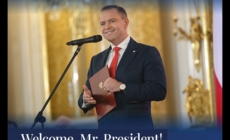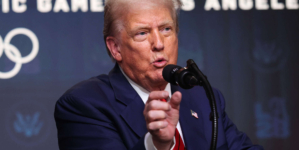-
UC must reconsider ban on campus jobs for undocumented students - about 1 min ago
-
President Congratulates His Newly Inaugurated Polish Counterpart - 14 mins ago
-
Katy Perry joins other stars who dated politicians with Justin Trudeau rumors - 18 mins ago
-
Diamondbacks 31-Year-Old, 215-Pound Outfielder Sets Insane MLB Record - 32 mins ago
-
2025 NFL Preseason Odds: John Harbaugh Best ATS; Dan Quinn Worst - 32 mins ago
-
Trump immigration team revives once-shelved deportation cases - 41 mins ago
-
Dozens missing after deadly mudslide tears through Indian village - 44 mins ago
-
Trump News Updates: President To Make Major Announcement Today - about 1 hour ago
-
Nick Wright on Luka Doncic’s extension, Caleb Williams, Cowboys | FULL INTERVIEW | The Herd - about 1 hour ago
-
Medieval Majesty on Display During Coronation City’s Royal Days - about 1 hour ago
Russia Could Face 500% Uranium, Oil Tariffs Under GOP-Backed Proposal
U.S. legislation that would slap hefty tariffs on key Russia’s exports—if Moscow does not agree to a peace deal with Kyiv—is a “significant step” to ending Vladimir Putin’s brutality, the non-profit Razom for Ukraine has told Newsweek.
Sens. Lindsey Graham (R-S.C.) and Richard Blumenthal (D-Conn.) are the lead sponsors of the bipartisan bill which would impose primary and secondary sanctions against Russia and entities supporting Putin’s aggression if Moscow does not engage in peace talks or undermines Ukraine’s sovereignty.
The bill includes imposing 500 percent tariffs on imported goods from countries that buy Russian oil, gas, uranium and other products.
Razom for Ukraine founder Svitlana Romanko told Newsweek on Tuesday the move could deal a serious blow to Russia’s financing of the war. Newsweek has contacted the Kremlin for comment.
Amir Levy/Getty Images
Why It Matters
President Donald Trump’s has expressed growing impatience with what he perceives to be the Russian leader’s delaying tactics over a peace deal in the war in Ukraine.
Amid concerns the Trump administration would hand Moscow an advantage in peace negotiations, the bill sponsored by 25 Republicans and 25 Democrats signals an unusual level of cross-party consensus against Putin’s aggression.
What To Know
Sens. Graham and Blumenthal were lead sponsors of “The Sanctioning Russia Act of 2025” which looks to impose primary and secondary sanctions against Russia if it does not agree to long lasting peace with Ukraine.
A group of 50 Democratic and Republican lawmakers backed the draft legislation which also seeks to impose a 500 percent tariff on imported goods from countries buying Russian oil, gas, uranium.
The senators said in a press release that the sanctions were hard hitting because “the dominating view” in the U.S. Senate is that Russia is the aggressor in Ukraine.
Trump has pledged to end the war quickly but he is becoming increasingly vexed at Putin for stalling an end to the conflict. The Russian president rejected a Washington proposal for a ceasefire and added conditions to a Black Sea ceasefire plan last week which was followed by continued Russian missile and drone strikes.
Senators who signed the bill also expressed their annoyance at Putin over stalled peace efforts in their statement.
Razom for Ukraine CEO, Romanko, said that the bill would be a significant step towards ending Russia’s ability to fund its continuous aggression and brutality. These measures could deal a serious blow to the Kremlin’s fossil fuel revenues, which remain one of its primary sources of war financing, she added.
However, she said that the U.S. must go further and immediately ban American firms, like oil service company Schlumberger (SLB) from providing services to Russia’s fossil fuel sector. Last year U.S lawmakers questioned why SLB had been granted a waiver to work in Russia.
Romanko added that only a complete shutdown of Russian oil and gas revenue can effectively weaken Putin’s desire for war and bring peace to Ukraine.
Imogen Payter, UK Friends of Ukraine Director told Newsweek the proposed sanctions and tariffs in the bill would help close the loophole allowing third party countries to refine Russian oil.
What People Are Saying
U.S. Senators backing the sanctions bill: “The sanctions against Russia require tariffs on countries who purchase Russian oil, gas, uranium and other products. They are hard hitting for a reason,” the Senators wrote in a Tuesday release.
“The dominating view in the United States Senate is that Russia is the aggressor, and that this horrific war and Putin’s aggression must end now and be deterred in the future.”
Razom for Ukraine founder Svitlana Romanko: “The new proposed bipartisan U.S. legislation, including primary and secondary sanctions, and tariffs of up to 500%, would be a significant step towards ending Russia’s ability to fund its continuous aggression and brutality.
“These measures could deal a serious blow to the Kremlin’s fossil fuel revenues, which remain one of its primary sources of war financing.”
Imogen Payter, UK Friends of Ukraine Director, to Newsweek: “It is heartening to see at a time when U.S. support for Ukraine has been waning that there is a bipartisan attempt to pass primary and secondary sanctions against Russia, if it fails to stop its war of aggression against Ukraine.”
What happens next
The House version of the legislation is also being introduced with the support of both Republicans and Democrats, which will add pressure on Putin. Meanwhile, the Trump administration is likely to continue its push for a deal with Russia in the coming weeks.
Source link































